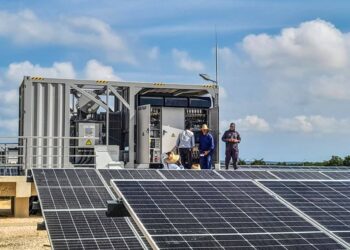You can get to the Bambú Centro walking through Chinatown till you get to Zanja Street. Walk down Rayo Street until you find a wooden door with a sign: “Bambú Centro” which below has another a little bigger with the activities of the month, which can be read: workshop for children, the latest summer activities and “we are in the Cuba Pavilion Fair “. But you can also go up Galiano till Zanja. Being there in the vortex of Havana is essential part of who they are.
Carlos Martínez Romero, director of Bambu Centro Project, welcomes us to his studio in an old warehouse in Centro Habana, where bamboo is a huge trunk that occupies most of the space. Therein bamboo shines and illuminates. Also assails the incessant sound of cutting machines deafening roar of the city on Monday at eleven o’clock. It’s easy to get lost among the trees, noise, dust and light.
“Bambú Centro is a project of craftsmen, artists and professionals attached to the Cultural Goods Fund. My wife, other colleagues and I banded together on this project and beyond what we thought at the beginning, it has become a way of life. We try to unite us around a social activity from the sense of commitment and responsibility with social problems, and of the neighborhood. But with a very clear idea: if we do not have a good economy we cannot fulfill what we set out to do, “Carlos Martinez told OnCuba.
For Carlos and Gisela Vilaboy, his wife and artist associated with the project, becoming a cooperative is the path they have chosen for further development from the economic and social activity. “We worked bamboo and natural fibers. We make furniture, interior decorations, we work with textile fibers. We make almost everything out of bamboo, “he says.
In the municipality of Centro Habana, after the decree-law on cooperatives was approved in the urban and industrial sector, the establishment of nine cooperatives in green markets, services and other projects presented was initiated. Others are still in the approval process. Bambú Centro is one of them. “We are now forming a cooperative,” said his representative. “We were the first in the municipality of Centro Habana that propose the government to form a cooperative, and have not been able to establish ourselves as of yet,” he adds.
They agree that the important thing to be cooperative is to promote an awareness of what that means. And only then they can continue to develop independently and beyond the changes. They believe in the benefits of a new collective work organization. But they can also see that the changes cannot be given only by facts, but to change the way we “look and feel to then do it again.”
According to Carlos Martinez, “on today´s Cuba a cooperative I think it is an attempt by a group of people to make productive activity with recognition from the legal standpoint. Today we have a situation with cooperatives that is very complex. We have a provisional law, we have a desire by the state, are an alternative to strengthen socialism; but we don’t have cooperatives. Cooperatives in today´s Cuba is still a dream.”
For Carlos it is also facing market logics that undermine artisan products. A real danger for future Cuba. So he believes in cooperatives as a tool to strengthen with others. To confront capital with ideas that become capitals.
“Perhaps those who feel cooperatives in Cuba today are better placed to meet the challenges of the economy. Because tomorrow foreign capital would be given preference in investment in Cuba, and we, the artisans and cooperative members, we have to fight – ultimately against the product that is going to be in the market. We have achieved good results in Bambú Centro and practically our working capital is our pocket money. We had to develop men and women more than capital. That way, then we’ll get the first to have a worker or a new, different worker. For us, the cooperative is a possibility of survival, “he believes.
At Bambu Centro they highly valued working with the community, specifically with children and women. “We’re trying to get the women here in the neighborhood linked to the project and work with us,” says Gisela. “” Because if at the end of a production they take home more pay, the result of their work. Becoming a cooperative is a path that can give us very good results and can revert to the municipality and especially for us women often are a bit isolated. I as a woman I fulfill myself with this: doing community, artistic and cooperative work. ”
Bamboo Center is now a project of artisans and artists; it is a cooperative in the making. From this status they look at the economic and social issue with the eye of criticism. That which goes hand in hand with actual practice, with “the social commitment that we all need.” Because it’s an honest way to make, to create and be created and as citizens of an island where nature becomes art, where bamboo is turned into furniture in vase, jug, in bags and necklaces.
“We want to make 2015 the first year of the project where we participate in all national and international fairs to be made in the City of Havana: Art for Mom, Art at La Rampa, Habanarte, FIART Book Fair, all” announces Carlos Martinez. “Having more presence in the domestic market, and we are succeeding. Stick with the Cooperative Peñas we do here every month. We are not perfect, we are under construction. In addition, we have hope: we do a noble activity.”









